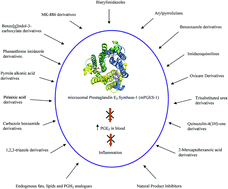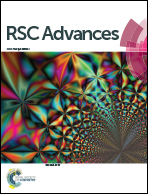Chemistry and biology of microsomal prostaglandin E2 synthase-1 (mPGES-1) inhibitors as novel anti-inflammatory agents: recent developments and current status
Abstract
Prostaglandin (PG) E2, a key mediator of inflammatory pain and fever, is biosynthesized from PGH2 by microsomal prostaglandin E2 synthase-1 (mPGES-1). During inflammation the expression of mPGES-1 increases resulting in increased PGE2 formation. Specific inhibition of mPGES-1 reduces the biosynthesis of PGE2, sparing other physiologically important PGs such as prostacyclin (PGI2) and thromboxane A2 (TXA2). Inhibition of mPGES-1 might be superior over the inhibition of cyclooxygenases (COX), as the latter leads to the suppression of PGI2, TXA2 along with the pathogenic PGE2 resulting in gastro-intestinal, renal and cardiovascular complications. Therefore, inhibition of mPGES-1 has been proposed as a promising approach for the development of drugs for inflammation and pain therapy, which only suppresses PGE2 biosynthesis, avoiding the side effects caused by nonsteroidal anti-inflammatory drugs (NSAIDs) and specific COX-2 inhibitors. The current review article includes natural and synthetic inhibitors of mPGES-1 reported since 2000 with their in vitro activity (IC50 values), in vivo activity, the status of clinical candidates, and critical appraisal of these reported inhibitors.


 Please wait while we load your content...
Please wait while we load your content...